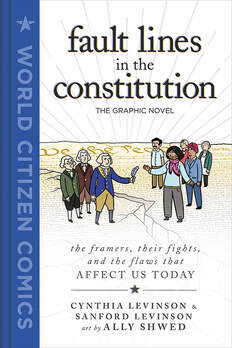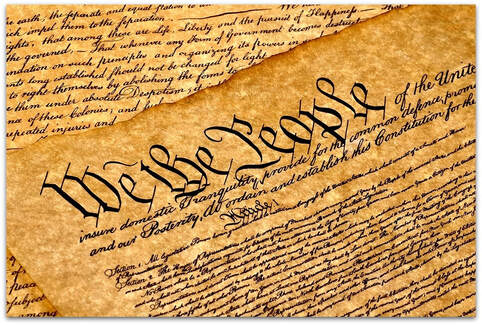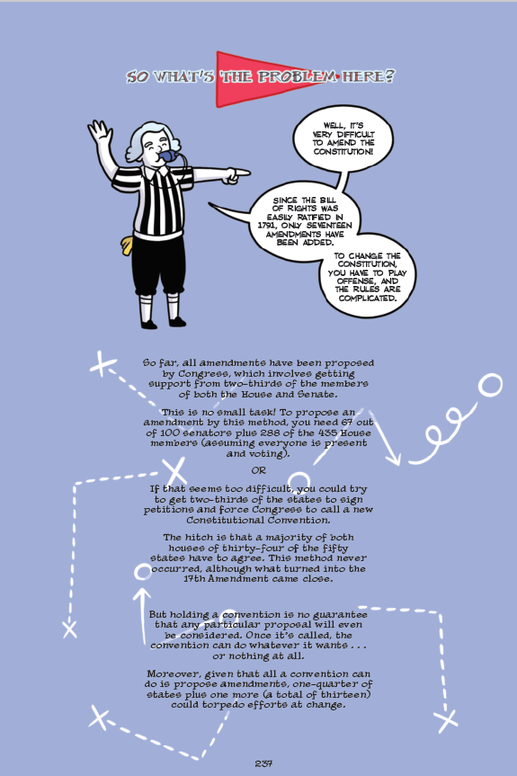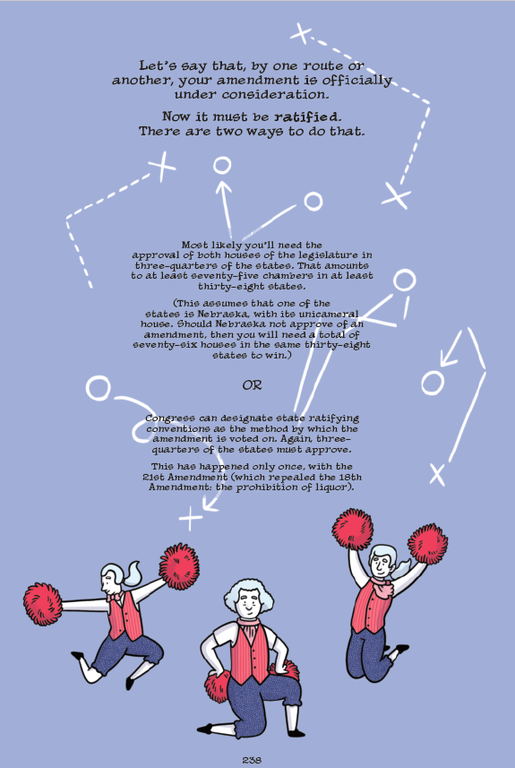Others see the Constitution as a living document to be interpreted in light of changing thought and circumstance. This view has brought us labor rights and protections, equal rights for people of all colors, persuasions and genders. It's brought us social security, Medicare and, so far, allowed the Affordable Care Act to stand. To shed more light on the Constitutional debate, I've invited author and friend Cynthia Levinson to tell you about her new kids' book and graphic novel Fault Lines in the Constitution. A graphic look at the |
People have also seen similarities between autocratic leaders around the world today and those in the 1930s-1940s in Germany and elsewhere.
Similarly, for many years, my husband, Sanford Levinson, who is a constitutional scholar, has said, while looking at contemporary domestic political issues, “Follow the dots.” Follow them where? To our Constitution.
To tell you the truth, although I had read all of his books, I didn’t fully understand what he meant until he and I wrote a book for young readers together.
That has now turned into two books--Fault Lines in the Constitution: The Framers, Their Fights, and the Flaws that Affect Us Today (Peachtree Publishers, 2017, updated in 2019) and Fault Lines in the Constitution: The Graphic Novel, illustrated by Ally Shwed (First Second/Macmillan, 2020).
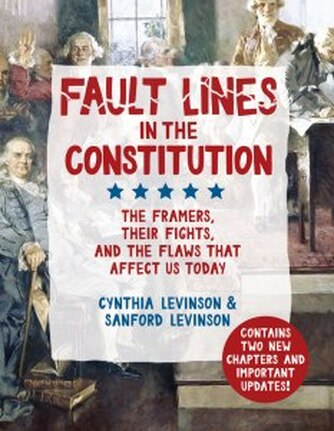
Researching and writing the books, I realized he was right: many issues in the news today can be traced directly back to what the Framers of our Constitution set in motion in Philadelphia in 1787.
We’re careful not to criticize the Framers. The handiwork they wrought—the government they created out of their reading, their negotiations, and their imaginations—was a marvel for the time.
For better or worse—and, as you can tell from our title, we believe, often for worse—this document has remained largely unchanged. Let me give you some examples of ways that 1787 still reverberates in 2020 and, undoubtedly, beyond.
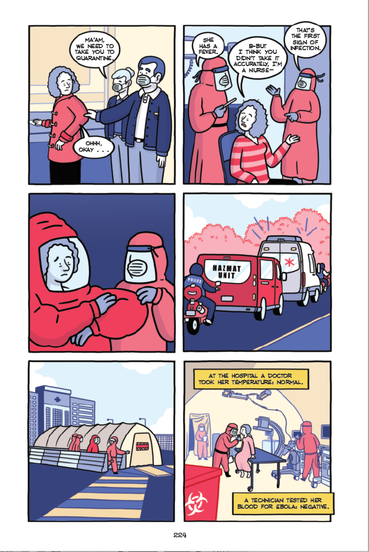
To show the link between 1787 and now, every chapter starts with a story; most of the stories are recent.
In “At War with Bugs: Habeas Corpus,” we talk about an American nurse who treated Ebola patients in Sierra Leone in 2014.
She had the misfortunate of returning to the Newark, New Jersey airport the very day that state’s governor, Chris Christy, imposed an unnecessarily restrictive quarantine.
Kaci Hickox was incarcerated in a tent in a hospital parking lot, and she sued for the great writ—that is, the right to be released—as promised in the Constitution.
For better or worse, our current federal government has not instituted national policies to stem the spread of COVID-19.
A future government might do so and would need to balance country-wide protections against a disease versus constitutionally guaranteed individual rights.
But, probably at the top of everyone’s list right now is the Electoral College. Why—WHY?!—do we have an Electoral College? No other country in the world has anything similar, and it wreaks havoc with our presidential campaigns and elections.
This really breaks down to two questions: Why did the Framers create it? And, why is it still hanging around?
How to elect the president—which was a novel idea at the time—hamstrung the participants at the Constitutional Convention for months. The method depended on what the executive’s duties would be and how he (they assumed it would be a he) would relate to Congress. Until they worked out these details, they couldn’t decide who would choose him—the people or the legislature.
As we say in the book, that worked fine as long as George Washington was president.
I won’t go into all the mayhem this arrangement has caused over the centuries, except to say that the Electoral College has chosen the less popular candidate five times, so far.
So, why do we continue to tolerate its existence? Because of another fault line (my husband’s “favorite,” if favorite means most destructive)—the difficulty of amending the Constitution. It’s so complex and daunting, I’ll let Ally’s wonderful graphics lead you through the process.
All of them address the structural underpinnings of our governmental system. For instance, while most of us tend to take such matters as our bicameral legislature, a Senate with two senators per state regardless of the size of the population of each state, and the president’s veto power for granted, all of these turn out to have deeply unjust ramifications.
Somehow, we skipped impeachment, which surely belongs in the next edition, if there is one. But, even if there isn’t, the book shows no signs of becoming obsolete. In fact, we blog updates and welcome responses every month at
www.faultlinesintheconstitution.com.
Please, join the conversation or add your own favorite fault line!
Thank you, Cynthia! Always great to have you on the blog. Some of you may remember a previous guest post by Cynthia Levinson. You can learn more about Cynthia and see all her books here.
I have long held that the Constitution is overdue for a major review and revision as appropriate in accordance with Article Five which establishes criteria for Amendments or a new constitutional convention. We must ask if the words written 232 years ago remain applicable, after all since then we have advanced so far technologically as to be far beyond the possible comprehension of even so scientifically knowledgeable men as Jefferson and Franklin as to put their wildest projections far below what we have attained. Can anyone really think that Jefferson or Franklin could assume that we would have walked on the moon in 232 years or would patrol oceans, underwater with the ability to fire projectiles capable of exploding with the force of ten million tons of TNT (which of course they had never of) halfway around the world? Outside of the technological sphere look at the sociological sphere: A reading of the Federalist Papers makes clear that the right to bear arms was based SOLELY on the need for a ready militia for defense. It should be noted some states REQUIRED able bodied males to own a weapon in order to perform military duty when required. One of the major conflicts between Jefferson and Hamilton was whether or not to raise and maintain a standing army and defense which Jefferson feared (with some justification) that Hamilton would use to create a monarchy. Donald Trump has placed a spotlight on many of the weaknesses in our democratic government: we were lucky this time, we might not be when the next would be autocrat comes along.
I also post here about my books and feature other authors and their books on compelling and important historical topics.
Occasionally, I share what makes me happy, pictures of my garden, recipes I've made, events I've attended, people I've met. I'm always happy to hear from readers in the blog comments, by email or social media.
Archives
September 2023
August 2023
July 2023
March 2023
February 2023
January 2023
December 2022
July 2022
June 2022
April 2022
February 2022
January 2022
September 2021
August 2021
July 2021
May 2021
April 2021
March 2021
February 2021
January 2021
October 2020
August 2020
June 2020
May 2020
March 2020
December 2019
July 2019
June 2019
May 2019
April 2019
March 2019
February 2019
January 2019
December 2018
November 2018
October 2018
July 2018
May 2018
April 2018
January 2018
December 2017
November 2017
October 2017
September 2017
July 2017
June 2017
May 2017
April 2017
March 2017
February 2017
December 2016
October 2016
September 2016
August 2016
July 2016
June 2016
May 2016
April 2016
March 2016
February 2016
January 2016
November 2015
October 2015
September 2015
August 2015
July 2015
June 2015
May 2015
April 2015
March 2015
February 2015
January 2015
December 2014
November 2014
October 2014
September 2014
August 2014
July 2014
June 2014
May 2014
April 2014
March 2014
February 2014
January 2014
December 2013
November 2013
October 2013
September 2013
August 2013
July 2013
June 2013
March 2013
January 2013
November 2012
July 2012
June 2012
May 2012
January 2012
December 2011
November 2011
October 2011
August 2011
July 2011
April 2011
March 2011
February 2011
January 2011
December 2010
November 2010
October 2010
Categories
All
Books
Climate/Environment
Coffee
Courage
Day To Day
Dealing With Demons
Eat Drink & Be Mary
Food
Gardening
Getkidzlit
Historical Fiction
History
History & Literature
Literature
Media Literacy
Nonfiction
